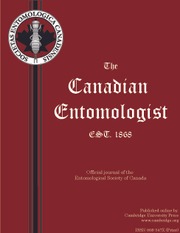Crossref Citations
This article has been cited by the following publications. This list is generated based on data provided by
Crossref.
Arthur, A. P.
1966.
Associative Learning in Itoplectis conquisitor (Say) (Hymenoptera: Ichneumonidae).
The Canadian Entomologist,
Vol. 98,
Issue. 2,
p.
213.
Mohyuddin, A. I.
1972.
Distribution, biology and ecology of Dentichasmias busseolae Heinr. (Hym., Ichneumonidae), a pupal parasite of graminaceous stem-borers (Lep., Pyralidae).
Bulletin of Entomological Research,
Vol. 62,
Issue. 2,
p.
161.
Markl, Hubert
1974.
The Physiology of Insecta.
p.
3.
Doutt, R.L.
Annecke, D.P.
and
Tremblay, E.
1976.
Theory and Practice of Biological Control.
p.
143.
Wardle, A.R.
and
Borden, J.H.
1985.
AGE-DEPENDENT ASSOCIATIVE LEARNING BY EXERISTES ROBORATOR (F.) (HYMENOPTERA: ICHNEUMONIDAE).
The Canadian Entomologist,
Vol. 117,
Issue. 5,
p.
605.
Dethier, V. G.
1986.
Evolutionary Genetics of Invertebrate Behavior.
p.
319.
Wardle, A. R.
and
Borden, J. H.
1986.
Detrimental effect of prior conditioning on host habitat location by Exeristes roborator.
Naturwissenschaften,
Vol. 73,
Issue. 9,
p.
559.
H�rard, F.
Keller, M. A.
Lewis, W. J.
and
Tumlinson, J. H.
1988.
Beneficial arthropod behavior mediated by airborne semiochemicals.
Journal of Chemical Ecology,
Vol. 14,
Issue. 7,
p.
1597.
Jansson, Richard K.
and
Lashomb, James H.
1988.
Host‐habitat conditioning in the eulophid egg parasitoid, Edovum puttleri: effects of herbivore's host and its food plant.
Entomologia Experimentalis et Applicata,
Vol. 46,
Issue. 2,
p.
173.
Turlings, Ted C. J.
Tumlinson, James H.
Lewis, W. Joe
and
Vet, Louise E. M.
1989.
Beneficial arthropod behavior mediated by airborne semiochemicals. VIII. Learning of host-related odors induced by a brief contact experience with host by-products inCotesia marginiventris (Cresson), a generalist larval parasitoid.
Journal of Insect Behavior,
Vol. 2,
Issue. 2,
p.
217.
KAISER, L.
PHAM‐DELEGUE, M. H.
and
MASSON, C.
1989.
Behavioural study of plasticity in host preferences of Trichogramma maidis (Hym.: Trichogrammatidae).
Physiological Entomology,
Vol. 14,
Issue. 1,
p.
53.
Kaiser, L.
Pham-Delegue, M. H.
Bakchine, E.
and
Masson, C.
1989.
Olfactory responses ofTrichogramma maidis Pint, et Voeg.: Effects of chemical cues and behavioral plasticity.
Journal of Insect Behavior,
Vol. 2,
Issue. 5,
p.
701.
Vet, Louise E. M.
and
Groenewold, Alex W.
1990.
Semiochemicals and learning in parasitoids.
Journal of Chemical Ecology,
Vol. 16,
Issue. 11,
p.
3119.
Kaas, J. P.
Elzen, G. W.
and
Ramaswamy, S. B.
1990.
Learning in Microplitis croceipes Cresson (Hym., Braconidae).
Journal of Applied Entomology,
Vol. 109,
Issue. 1-5,
p.
268.
Turlings, Ted C. J.
Scheepmaker, J. W. A.
Vet, L. E. M.
Tumlinson, J. H.
and
Lewis, W. J.
1990.
How contact foraging experiences affect preferences for host-related odors in the larval parasitoidCotesia marginiventris (Cresson) (Hymenoptera: Braconidae).
Journal of Chemical Ecology,
Vol. 16,
Issue. 5,
p.
1577.
Vet, L. E. M.
Lewis, W. J.
Papaj, D. R.
and
van Lenteren, J. C.
1990.
A variable-response model for parasitoid foraging behavior.
Journal of Insect Behavior,
Vol. 3,
Issue. 4,
p.
471.
McAuslane, Heather J.
Bradleigh Vinson, S.
and
Williams, Howard J.
1991.
Influence of adult experience on host microhabitat location by the generalist parasitoid,Campoletis sonorensis (Hymenoptera: Ichneumonidae).
Journal of Insect Behavior,
Vol. 4,
Issue. 1,
p.
101.
Kester, K.M.
and
Barbosa, P.
1991.
Behavioral and ecological constraints imposed by plants on insect parasitoids: Implications for biological control.
Biological Control,
Vol. 1,
Issue. 2,
p.
94.
Turlings, Ted C. L.
Wäckers, Felix L.
Vet, Louise E. M.
Lewis, W. Joseph
and
Tumlinson, James H.
1993.
Insect Learning.
p.
51.
Feener Jr, Donald H.
and
Brown, Brian V.
1997.
DIPTERA AS PARASITOIDS.
Annual Review of Entomology,
Vol. 42,
Issue. 1,
p.
73.




